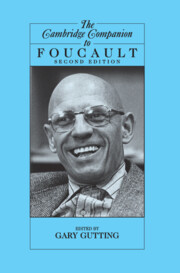Book contents
- Frontmatter
- Introduction Michel Foucault: A User’s Manual
- 1 Foucault’s Mapping of History
- 2 Foucault and the History of Madness
- 3 The Death of Man, or Exhaustion of the Cogito?
- 4 Power/Knowledge
- 5 Ethics as Ascetics: Foucault, the History of Ethics, and Ancient Thought
- 6 Michel Foucault’s Ethical Imagination
- 7 The Analytic of Finitude and the History of Subjectivity
- 8 Foucault’s Encounter with Heidegger and Nietzsche
- 9 Foucault and Habermas
- 10 Foucault’s Relation to Phenomenology
- 11 Against Interiority: Foucault’s Struggle with Psychoanalysis
- 12 Foucault’s Modernism
- 13 Queering Foucault and the Subject of Feminism
- Bibliography
- Addendum to Bibliography, 1993–2005
- Index
10 - Foucault’s Relation to Phenomenology
Published online by Cambridge University Press: 28 August 2006
- Frontmatter
- Introduction Michel Foucault: A User’s Manual
- 1 Foucault’s Mapping of History
- 2 Foucault and the History of Madness
- 3 The Death of Man, or Exhaustion of the Cogito?
- 4 Power/Knowledge
- 5 Ethics as Ascetics: Foucault, the History of Ethics, and Ancient Thought
- 6 Michel Foucault’s Ethical Imagination
- 7 The Analytic of Finitude and the History of Subjectivity
- 8 Foucault’s Encounter with Heidegger and Nietzsche
- 9 Foucault and Habermas
- 10 Foucault’s Relation to Phenomenology
- 11 Against Interiority: Foucault’s Struggle with Psychoanalysis
- 12 Foucault’s Modernism
- 13 Queering Foucault and the Subject of Feminism
- Bibliography
- Addendum to Bibliography, 1993–2005
- Index
Summary
Insofar as comprehension means at once to gather together, to grasp immediately, and to penetrate, this new reflection on mental illness is above all “comprehension” (understanding). It is this method that phenomenological psychology has practiced.
Michel Foucault, 1954If there is one approach that I do reject, however, it is that (one might call it, broadly speaking, the phenomenological approach) which gives absolute priority to the observing subject, which attributes a constituent role to an act, which places its own point of view at the origin of all historicity – which, in short, leads to a transcendental consciousness.
Michel Foucault, 1970It is a hazardous business to use Michel Foucault's interviews as a key to understanding his thought. One cannot be sure when he is speaking seriously and when tongue in cheek. For instance, although he seldom cites Heidegger in his studies and refers nowhere to the ontological difference, he claimed in an interview that, “Heidegger has always been for me the essential philosopher. . . .My whole philosophical development was determined by my reading of Heidegger.” What exactly are we to make of that? If Foucault's interviews are offered as self-interpretations of his work, it is best to approach those interpretations with one's own interpretive care.
- Type
- Chapter
- Information
- The Cambridge Companion to Foucault , pp. 284 - 311Publisher: Cambridge University PressPrint publication year: 2005
- 10
- Cited by



